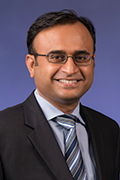Transplant Division
The Downstate Transplant Program of the State University of New York (SUNY) was established in 1965. Two transplant pioneers, transplant surgeon Dr. Samuel L. Kountz and transplant nephrologist Dr. Eli Friedman, initially directed one of the largest kidney transplant programs in the Northeast and one of the first ones in the nation to exceed 1,000 kidney transplants. In 1961, while working at Stanford University Medical Center, Dr. Kountz performed one of the first successful kidney transplants between humans who were not identical twins. Six years later, he and a team of researchers at the University of California, San Francisco, were involved in the development of the prototype for the "Belzer" kidney perfusion machine, a device that could preserve kidneys for up to 50 hours. In 1976, Dr. Friedman invented the "Suitcase Kidney," a portable dialysis machine scaled to fit a metal attache case. It permitted dialysis patients to perform hemodialysis off site and, at the time, provided them with freedom from local dialysis centers and enhanced quality of life.
Subsequently, the Division of Transplantation was led by Drs. Khalid Butt, Bruce Sommer, Dale Distant and Devon John. To date, Downstate's kidney transplant program has performed more than 3,000 kidney transplants and remains a leader in innovative therapy. In 1966, the first successful dual kidney transplant in New York State was done at SUNY Downstate. Dual kidney transplants expand the use of kidneys that might not otherwise be transplanted.
Kidney transplants from living donors provide better outcome than from deceased donors, basically doubling the median kidney graft survival from 10 to 20 years. We passionately promote living over deceased donation. All of our donors undergo laparoscopic donor nephrectomy which requires only a small incision and reduces postoperative pain and length of hospitalization (2-4 days on average). In 2018, SUNY-Downstate became the first institution to perform a kidney transplant from a living donor after the patient had undergone a living donor intestinal (bowel) transplant 10 years earlier.
Patient education is highly emphasized at SUNY Downstate, both pre- and post-transplant. Transplant candidates are encouraged to learn as much as possible about transplantation and both formal and informal teaching sessions are an integral part of the program. We also conduct donor-specific education sessions during which potential donors meet and freely interact with those who have already donated a kidney to a family member. These meetings facilitate open discussion of many issues, especially those of personal concern to donors, and allows potential donors the opportunity to have their non-medical questions answered from the perspective of those who have experienced the procedure first hand.
SUNY-Downstate's transplant program clearly stands out by providing services to one of the most ethnically diverse patient population in the nation. As part of the only public Medical School in New York City it also delivers transplant care to an underserved patient population across all Brooklyn neighborhoods.
The SUNY Downstate transplant team is proud of its long history of accomplishments and works diligently to maintain the highest standards of care and professionalism. We welcome input from patients and their families, referring physicians and all health care professionals and are available 24 hours a day to meet the needs of all patients with kidney failure and insulin-dependent diabetes mellitus.

Sumanth C. Suresh, MD
Assistant Professor of Surgery
Chief of Transplant Surgery and Surgical Oncology Surgery